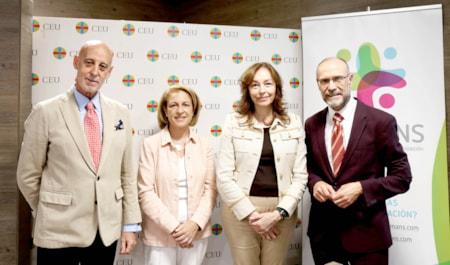
The humanisation of healthcare in Spain is itself looking healthy. However, there is room for further development of the Humanisation strategies and plans already implemented in the healthcare sector, and there is a need for these initiatives to be further rolled out nationwide. There is also a need for humanisation strategies to be generated at a national level, under the direction of the Ministry of Health, to strengthen and promote homogeneous and robust humanisation policies. These are some of the conclusions drawn from the report ‘The status of Humanisation of Healthcare in Spain.’
The document represents the first national study to analyse the existing models of Humanisation strategies and plans from all the autonomous regions and their respective health services. The work has been carried out by the Humans Foundation for the promotion of the Humanisation of social and health care and Universidad CEU San Pablo, within the framework of the alliance that led to the creation of the Observatory of Humanisation. One of the functions of the Observatory is to monitor aspects of the healthcare system that need to be improved so that care for people is carried out according to the values and principles of social and health humanism.
The project is coordinated by José Antonio Martín Urrialde, vice president of the Humans Foundation and director of the Observatory of Socio-health Humanisation of the Chair of Medical Education and Humanisation "Nemesio Diez" at Universidad CEU San Pablo. In his words: "The current state of humanisation in Spain reflects a commendable initial commitment, but we must not stop there. It is essential to recognise that there are still significant areas for improvement. In fact, our report highlights urgent needs which would ensure more humane and person-centred care in every corner of the country. Ultimately, this report is a crucial step towards the continuous improvement of our healthcare system, ensuring that it is based on the fundamental values of social and health humanism."
Main Conclusions of the Report
The project will be reviewed and updated so as to be an open and participatory forum for healthcare administrations and will serve as an objective, scientific, rigorous tool for the efficient and humane management of the healthcare system. Among the main conclusions highlighted by the project coordinator are:
· The need for staff training in the areas of humanisation and communication, improving the recognition of these areas at a professional level and enhancing the process of care and health promotion.
· The establishment and development of programmes integrated into university studies and ongoing professional development, which would include the teaching of competencies and skills related to communication and humanisation.
· All the services analysed have adequate accessibility, communication channels, and valid and developed participation instruments, using telemedicine and technology for communication, assistance, and follow-up tasks.
· The training and awareness of citizens in aspects related to their health are fundamental for guaranteeing the success of the culture of humanisation of healthcare.
· The absence of national humanisation policies weakens research in this area and creates heterogeneity in the approaches and strategic plans.
Evaluating the impact of each humanisation plan
This mapping of Humanisation strategic plans is a comparative work that will be highly useful for health service professionals, for managers, decision-makers, and health planners, when evaluating the impact of their plans and new actions. Furthermore, it will provide the appropriate framework for observing the different trends and orientations in health plans and will generate synergies that unify and strengthen the healthcare system in order to increase its equity and sustainability.
“This report strives to synthesize and analyse all the Humanisation activities that are currently being carried out in our country,” says Julio Zarco, president of the Humans Foundation. He adds, “From the 1980s, when the General Health Law was created, structuring and organising our healthcare, right up to the early 21st century, there was no organised work or institutional initiative carried out on strategic Humanisation plans for healthcare. Now, in 2024, the situation is radically different. In recent years, the vast majority of autonomous communities have established their own departments, sub-directorates, and directorates of Humanisation. So we can say that, at this moment in time, the Humanisation of healthcare in our country is a reality.”
The rector of the University, Rosa Visiedo, values the publication of this report, which responds to the objective of the Observatory to promote research, knowledge, and development in the humanisation of social and health care. She highlights that the School of Medicine of CEU USP is, and aims to continue to be, a reference in training in humanisation for future health professionals, through working actively with the different health agents to achieve efficient and humane management of the healthcare system.